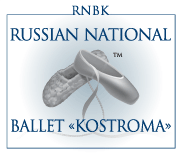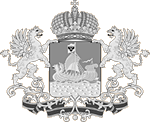|
The old mansion situated in the historical centre of Kostroma keeps under its roof a whole world called the Art of Dance.
“The Russian National Ballet “Kostroma" artists, Dance College “The Governorate Ballet School” affiliated with “The Russian National Ballet “Kostroma” students and younger students of “The Chldren Dance School” consider this building to be their second home and themselves to be a big family.
Following the example of the first Russian State Academic Company of Folk Dance created by and named after Igor Moiseev the founders and the directors of “The Russian National Ballet “Kostroma" Elena and Yuri Tsarenko set up their own ballet school. The choreography studio for children, later to become «The Children Dance School”, lived up to the expectations invested in it. It became the corner stone for setting up the College.
|
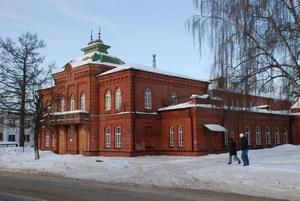 |
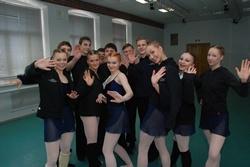 |
“Ballet has no right to exist if there is no inflow of new artistic energy coming out from the experience of the previous generations…” – says the President of “The Russian National Ballet “Kostroma", Honoured cultural worker of the Russian Federation, Elena Tsarenko.
The dance school (today the College) “The Governorate Ballet School" opened in September 2002 as a non-state educational institution of secondary professional education and a structural subdivision of “The Russian National Ballet “Kostroma”. It was licensed for its activities in the same year.
The main target of the dance school "The Governorate Ballet School” is to train young, strong and skilled generations of dancers for “The Russian National Ballet “Kostroma” by combining traditional and experimental educational methods, by instilling patriotism and awakening the feeling of love towards Russian history and culture.
|
Quality education and a prestigious profession
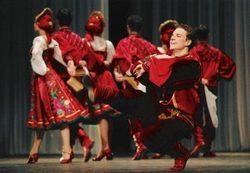 |
In the world of art a ballet artist is considered to be a prestigious profession, the teachers themselves would say: “…we are doing craftwork”.
Enrolment for the first year in “The Governorate Ballet School” college (20 students) takes place once in four years. Professional disciplines are studied in groups of 10 people thus the education might be considered to be customized and personalized. The applications can be submitted by students of ballet classes of “The Russian National Ballet "Kostroma" and by other dance companies’ students who have a good grounding and appropriate physical abilities relevant to the requirements for those applying to a dance school.
|
Russian National Ballet "Kostroma", as the college founder and the guaranteed employer, pays for the education of the students, providing an opportunity to work off the cost of education after the graduation from "The Governorate Ballet School" as the artists of "Russian National Ballet "Kostroma". The period of the working off corresponds to a five-year apprenticeship. In this case, the students do not spend their own financial recourses on education and have a guaranteed, out-of-competition job placement in "Russian National Ballet "Kostroma", where during five years the students get the salary, which is accrued on a general basis in accordance with the requirements for the professional artists of the ballet.
The course of studies takes place on the base of “The Russian National Ballet “Kostroma” having an address at Simanovskogo St, 70 Kostroma, ex-“Krasny Tkach”.
General education subjects and special disciplines
|
Modern requirements for education are reflected in the curriculum which both in volume and in content corresponds to the training requirements of a ballet artist. College students do more than 20 professional and 15 special disciplines.
The course of general education subjects consists of such subjects as history of choreography in Russia and other countries; theatre and ballet history; history and theory of music; musical literature; history of fine arts; interpretation of performances of choreographic legacy and interpretation of modern performances; anatomy, physiology and basics of ballet medicine; psychohygiene of ballet dancers; musical instrument; basics of philosophy and esthetics in the world artistic culture; and others.
Special disciplines are classic dance, stage folk dance; academic folk dance; ball dance; common historical dance; basics of duet dance; modern choreography styles (jazz, modern, step, etc.), acting skills; make-up; fencing; and others.
|
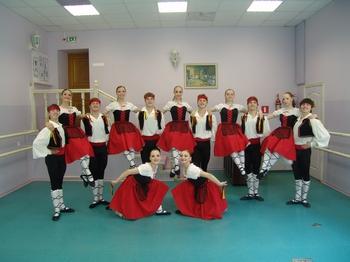 |
Humanitarian subjects are taught according to authors' programs worked out by the college professors. Among them are such programs as “World artistic culture and its world-view peculiarities: philosophy and literature”; an innovative program for the elective course of “Manner” which pays special attention to national and character manner of presentation of different dances; the program "Acting skills” created specially to make students emotionally deeply understand a character; the program “Basics of playing a musical instrument (the piano) which aims at awakening sense perception of music; and some others.
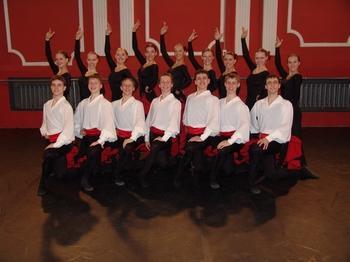 |
Practice: the professional practice of students takes place in “The Russian National Ballet “Kostroma”; they start to master the ballet repertoire and participate in its performances starting from the third year.
Master classes: we organize on a regular basis master-classes in such disciplines as “Classic dance”, “Folk stage (academic) dance”, “Acting skills", “Duet dance”, “History of theatre, music and choreography art” to enhance the quality level of the students' education. We invite the best professionals in Russia and high profile professors to hold master-classes in our college.
G. M. Apanayeva: People's artist of Russia, Director of School studio affiliated with the State Academic company of folk dance named after Igor Moiseev
N. N. Voskresenskaya, Honoured Artist of Russia, repertoire coach of the Kremlin Ballet, the author of an experimental method of teaching classic
N. F. Laktionov, laureate of state prize of the USSR, Honoured Art Worker, laureate of state prize of the Republic of Mongolia, Companion of Honour, the leading college professor (acting skills)
|
V. M. Okulova, Chief of Department “Choreographic Art” of the College of art and culture of the Republic Mari-El, high rank professor of classic dance discipline, Honoured Art Worker of the Republic Mari-El
|
N. I. Furaleva, Honoured Artist of the Russian Soviet Federative Socialist Republic, leading professor for classic and folk academic dance in Novosibirsk Dance College
M. V. Vasilyev, the Kremlin Ballet artist, Chief Editor Assistant of "Ballet" magazine
V. I. Belyh, an artist, a teacher of folk stage dance in Dance Academy and Director of folk department of Dance college named after Nesterova
A. A. Borzov, an artist, ballet master, a teacher, Honoured Artist of the Russian Soviet Federative Socialist Republic; Professor
Natalia Balahnicheva, a leading artist of the Kremlin Ballet
Konstantin Ivanov, ex-soloist of Bolshoi Theatre of Russia, art director of Maryiski State Theatre of Opera and Ballet named after Sapayev and College of Culture and Art of the Mari-El Republic
|
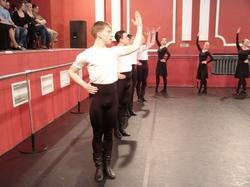 |
E. D. Koptelova, Honoured Art Worker of the Russian Federation, leading specialist of the Ministry of Cultural Affairs, teacher of “History of Art in Russia and foreign countries (theatre and ballet history)” discipline
"The Governorate Ballet School" college has had two graduation classes of professional artists of folk dance. In April 2007 the College, together with the students of the first graduation class, passed its first examination successfully having received attestation and state accreditation. Three years later, in May 2010, the second graduation class students joined the ranks of the College diplomats.
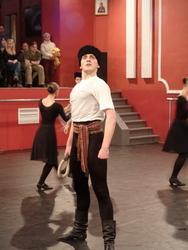
|
- Students had some experience of guest performances tours abroad (London, Shanghai, Beijing, Paris and other cities in France).
- They took part in III and IV International festivals of dance colleges and schools which are traditionally held in Kazan, they were invited to the Show Festival of state dance schools of Russia dedicated to the 235th anniversary of “The Moscow State Academy of Choreography” where they made a successful performance on the Bolshoi Theatre stage.
- They took part in events of local and state significance.
- They performed on the best stages of Russia (in State Academic Bolshoi Theatre, in State Kremlin Palace, in concert hall “Russia” and others).
- They also took part in charity concerts (for disabled children, children from broken families and low income families, etc.).
- Many of the fourth-year students had their first entry in their open work record books stating that they had been taken for the position of an artist of “The Russian National Ballet “Kostroma”.
Diploma project
Use of traditional and experimental methods of teaching allowed “The Governorate Ballet School” to move to a breakthrough level of education. Students demonstrate vivid results in their diploma projects which are traditionally presented in the form of two-act performance named “The World Called the Art of Dance” consisting of a classical and a folk part.
|
The year 2007 graduates presented an experimental adapted to folk dance version of "Romeo and Juliet" ballet in the first act and in the second act (folk dance) they performed a concert class consisting of ballet bar exercice, dance elements and tricks in parterre, dancing sketches and dances of the nations of the world.
|
The year 2010 graduates presented “Masterpieces of the world classic choreography" in original and performed in the first act solo and duet part from ballets “The Don Quixote”, “Taras Bulba”, “The Flame of Paris” and “ The Sleeping Beauty” without any changes and simplifications of the dancing lexis. In the second act one could enjoy a kaleidoscopic show of music, dancing, costumes and passions which consisted of such pieces as "Syzransky Chizhovniki", "Coachman's dance", "Gypsy dance", "Chinese dance", "Spanish dance", "Matanya", female sketch "Slow Russian dance", "Winter", Kalmyk dance “Hadris" performed by the second-year students of “The Governorate Ballet School”, a dance called “Suvorovtsy” performed by the students of Children Dance School and a traditional dance of all the graduates called “Jota Aragonesa”.
To support the new tradition the College graduates of the year 2007 performed together with the beginner artists, graduates of 2010, in some choreographic compositions.
|
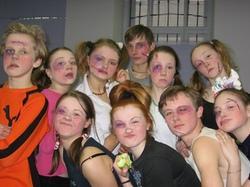 |
The faculty and the student cherish new traditions of their educational institution and try to keep the intergenerational continuity. Very soon the fourth generation of the student will say their oath at the ceremony of "Student initiation” and will carry on the existing tradition started by the first students of “The Governorate Ballet School”.
The future of “The Russian National Ballet “Kostroma” is connected with the 200 children aged from 6 to 17 years old who train at “The Governorate Ballet School” while its present is in the hands of 30 college graduates who are also the company’s reliable foundation. They have a stable job, interesting prospects and chances of professional self-actualization.







